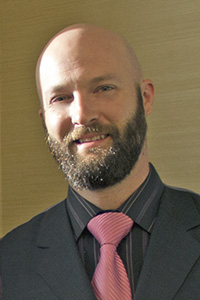You’re accessing archived content
This is archived content from the UIT website. Information may be outdated, and links may no longer function. Please contact stratcomm@it.utah.edu if you have any questions about archived content.
UIT's Fenech discusses student program with higher ed counterparts

Elliot Fenech,
Service Management
UIT's Elliot Fenech discussed the organization's Student Employee Program on November 3 as part of a national Cyberinfrastructure Engineering Brown Bag virtual event. A recording and slides of the presentation are available on Google Drive.
Fenech, manager of Logging & Monitoring on the Service Management team, oversees the program, which has evolved in recent years to better accomodate and prepare students for the job market.
Before taking over the program, Fenech received feedback from some students who had left the U with undergraduate and master’s degrees in IT fields but could not find jobs, yet their peers who had skipped higher education to develop applications or systems had launched successful careers.
UIT's student program is intended to provide meaningful professional experience, avoiding outdated ideas about student employment, namely, a cheap labor force relegated to low-level busy work. The program is designed to augment coursework with hands-on development and operations experience in a work situation that doesn't interfere with timely graduation. Students are paired with full-time staff mentors within the organization. These mentors, along with student leads, hold monthly or bi-monthly "resync" meetings to ensure that students are on track and program goals are being met.
UIT's student program has grown to approximately 60 students in 17 UIT units, under the guidance of about 30 mentors. Not only are students more professionally-marketable in a broader sense, UIT has been able to hone and retain talent internally.
"Most of the students who come to this are hungry for professional experience," Fenech said, noting that their experience varies – from joining supercomputing competitions to writing research grants. He said UIT tries to accommodate different group dynamics and preferences related to work environment.
"Some areas are team-based – noisy 'work hard, play hard' environments like [the TV show] 'Silicon Valley'," Fenech said. "Or, we ask, do they prefer solo-based work where there aren't a lot of other students, where you’re going to put on headphones and hammer out code for maybe a few hours?"
During a Q&A period, one attendee from the University of California, Berkeley asked Fenech how he scouts for demographically diverse IT students. Fenech admitted this remains a challenge, but said that his candidate pool has gradually become more ethnically, culturally and gender diverse, something he credits to the program's reputation and outreach efforts like speaking in classes (computer science, game development, business, etc.). Another question came from a staff member in a high-performance computing center at the University of Buffalo. She asked how UIT manages root administrative access for students. Fenech said that some mentors, particularly in research computing units that deal with sensitive data, address this issue by involving students at the proof-of-concept stage or quality assurance level, granting some high-level administration for process control, but short of unfettered system access.
Ultimately, Fenech said, it all comes down to treating students with respect.
"You’re helping to train someone to become you in the future," he said.
Node 4
Our monthly newsletter includes news from UIT and other campus/ University of Utah Health IT organizations, features about UIT employees, IT governance news, and various announcements and updates.
